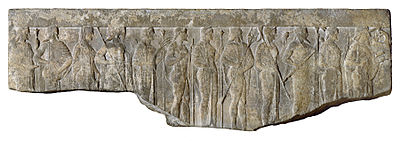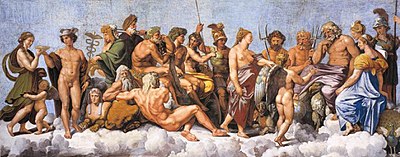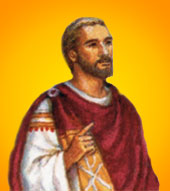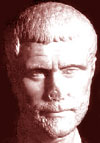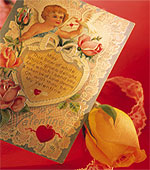God and Goddesses of OLYMPUS
In Greek mythology, the Twelve Olympians, also known as the Dodekatheon (Greek: Δωδεκάθεον < δώδεκα, dōdeka, "twelve"+ θεοί, theoi, "gods"), were the principal deities of the Greek pantheon, residing atop a mythical Mount Olympus. The Olympians gained their supremacy in a war of gods in which Zeus led his siblings to victory over the Titans.
The concept of the "Twelve Gods" is older than any extant Greek or Roman sources, and is likely of Anatolian origin.The gods meet in council in the Homeric epics, but the first ancient reference to religious ceremonies for the Olympians collectively is found in the Homeric Hymn to Hermes. The Greek cult of the Twelve Olympians can be traced to 6th-century BC Athens and probably has no precedent in the Mycenaean period. The altar to the Twelve Olympians at Athens is usually dated to the archonship of the younger Pesistratos, in 522/521 BC.
There was some variation as to which deities were included, but the canonical twelve as commonly portrayed in art and poetry were Zeus, Hera, Poseidon, Demeter, Athena, Hestia, Apollo, Artemis, Ares,Aphrodite, Hephaestus and Hermes.
Hades, known in the Eleusinian tradition as Pluto, was not usually included among the Olympians because his realm was the underworld. Plato connected the Twelve Olympians with the twelve months, and implies that he considered Pluto one of the twelve in proposing that the final month be devoted to him and the spirits of the dead.[5][6] In Phaedrus Plato aligns the Twelve with the Zodiac and would exclude Hestia from their rank.
In ancient Greek religion, the "Olympian Gods" and the "Cults of Twelve Gods" were often relatively distinct concepts. The Dodekatheon of Herodotus included Zeus, Hera, Poseidon, Hermes, Athena, Apollo, Alpheus, Cronus, Rhea and the Charites.[2][9] Herodotus also mentions that Heracles was included as one of the Twelve by some.At Kos, Heracles and Dionysus are added to the Twelve, and Ares and Hephaestus are not. For Pindar, the Bibliotheca,[12] and Herodorus, Heracles is not one of the Twelve Gods, but the one who established their cult.[2] Lucian (2nd century AD) includes Heracles and Asclepius as members of the Twelve, without explaining which two had to give way for them.
Hebe, Helios, Eros, Selene and Persephone are other important gods and goddesses who are sometimes included in a group of twelve. Eros is often depicted alongside the other twelve, especially his mother Aphrodite, but not usually counted in their number.
The Roman poet Ennius gives the Roman equivalents (the Dii Consentes) as six male-female complements,[6] preserving the place of Vesta (Greek Hestia), who played a crucial role in Roman religion as a state goddess maintained by the Vestals.
List of the OlympiansThe Twelve Major Gods
Greek name Roman name Image Functions and attributes Zeus Jupiter 
King of the gods and ruler of Mount Olympus; god of the sky and thunder. Youngest child of the Titans Cronus and Rhea. Symbols include the thunderbolt, eagle, oak tree, scepter and scales. Brother and husband of Hera, although he had many lovers. Brother of Poseidon and Hades. Hera Juno 
Queen of the gods and the goddess of marriage and family. Symbols include the peacock, pomegranate, crown, cuckoo, lion and cow. Youngest daughter of Cronus and Rhea. Wife and sister of Zeus. Being the goddess of marriage, she frequently tried to get revenge on Zeus' lovers and their children. Poseidon Neptune 
God of the seas, earthquakes and tidal wave. Symbols include the horse, bull, dolphin and trident. Middle son of Cronus and Rhea. Brother of Zeus and Hades. Married to the Nereid Amphitrite, although, like most male Greek Gods, he had many lovers. Demeter Ceres 
Goddess of fertility, agriculture, nature, and the seasons. Symbols include the poppy, wheat, torch, and pig. Middle daughter of Cronus and Rhea. Her Latin name, Ceres, gave us the word "cereal". Dionysus Bacchus 
God of wine, celebrations and ecstasy. Patron god of the art of theatre. Symbols include the grapevine, ivy, cup, tiger, panther, leopard, dolphin and goat. Son of Zeus and the mortal Theban princess Semele. Married to the Cretan princess Ariadne. The youngest Olympian, as well as the only one to have a mortal mother. Apollo Apollo (or Phoebus) 
God of light, knowledge, music, poetry, prophecy and archery. Son of Zeus and Leto. Symbols include the sun, lyre, bow and arrow, raven, dolphin, wolf, swan and mouse. Twin brother of Artemis. Artemis Diana 
Goddess of the hunt, virginity, childbirth, archery, the moon, and all animals. Symbols include the moon, deer, hound, she-bear, snake, cypress tree and bow and arrow. Daughter of Zeus and Leto and twin sister of Apollo. Hermes Mercury 
Messenger of the gods; god of commerce, thieves and games. Symbols include the caduceus (staff entwined with two snakes), winged sandals and cap, stork and tortoise (whose shell he used to invent the lyre). Son of Zeus and the nymph Maia. The second-youngest Olympian, just older than Dionysus. He married Dryope, the daughter of Dryops, and their son Pan became the god of nature, lord of the satyrs, inventor of the panpipes and comrade of Dionysus. Athena Minerva 
Virgin goddess of wisdom, handicrafts, defense and strategic warfare. Symbols include the owl and the olive tree. Daughter of Zeus and the Oceanid Metis, she rose from her father's head fully grown and in full battle armor after he swallowed her mother. Ares Mars 
God of war, violence and bloodshed. Symbols include the boar, serpent, dog, vulture, spear and shield. Son of Zeus and Hera, all the other gods (except Aphrodite) despised him. His Latin name, Mars, gave us the word "martial." Aphrodite Venus 
Goddess of love, beauty, and desire. Symbols include the dove, bird, apple, bee, swan, myrtle and rose. Daughter of Zeus and the Oceanid Dione, or perhaps born from the sea foam after Uranus' semen dripped into the sea after being castrated by his youngest son Cronus who then threw his father's genitals into the sea. Married to Hephaestus, although she had many adulterous affairs, most notably with Ares. Her name gave us the word "aphrodisiac", while her Latin name gave us the word "venereal".[B] Hephaestus Vulcan 
Master blacksmith and craftsman of the gods; god of fire and the forge. Symbols include fire, anvil, axe, donkey, hammer, tongs and quail. Son of Hera, either by Zeus or alone. Married to Aphrodite, though unlike most divine husbands, he was rarely ever licentious. His Latin name, Vulcan, gave us the word "volcano."
| Greek name | Roman name | Image | Functions and attributes |
|---|---|---|---|
| Zeus | Jupiter |  | King of the gods and ruler of Mount Olympus; god of the sky and thunder. Youngest child of the Titans Cronus and Rhea. Symbols include the thunderbolt, eagle, oak tree, scepter and scales. Brother and husband of Hera, although he had many lovers. Brother of Poseidon and Hades. |
| Hera | Juno |  | Queen of the gods and the goddess of marriage and family. Symbols include the peacock, pomegranate, crown, cuckoo, lion and cow. Youngest daughter of Cronus and Rhea. Wife and sister of Zeus. Being the goddess of marriage, she frequently tried to get revenge on Zeus' lovers and their children. |
| Poseidon | Neptune |  | God of the seas, earthquakes and tidal wave. Symbols include the horse, bull, dolphin and trident. Middle son of Cronus and Rhea. Brother of Zeus and Hades. Married to the Nereid Amphitrite, although, like most male Greek Gods, he had many lovers. |
| Demeter | Ceres |  | Goddess of fertility, agriculture, nature, and the seasons. Symbols include the poppy, wheat, torch, and pig. Middle daughter of Cronus and Rhea. Her Latin name, Ceres, gave us the word "cereal". |
| Dionysus | Bacchus |  | God of wine, celebrations and ecstasy. Patron god of the art of theatre. Symbols include the grapevine, ivy, cup, tiger, panther, leopard, dolphin and goat. Son of Zeus and the mortal Theban princess Semele. Married to the Cretan princess Ariadne. The youngest Olympian, as well as the only one to have a mortal mother. |
| Apollo | Apollo (or Phoebus) |  | God of light, knowledge, music, poetry, prophecy and archery. Son of Zeus and Leto. Symbols include the sun, lyre, bow and arrow, raven, dolphin, wolf, swan and mouse. Twin brother of Artemis. |
| Artemis | Diana |  | Goddess of the hunt, virginity, childbirth, archery, the moon, and all animals. Symbols include the moon, deer, hound, she-bear, snake, cypress tree and bow and arrow. Daughter of Zeus and Leto and twin sister of Apollo. |
| Hermes | Mercury |  | Messenger of the gods; god of commerce, thieves and games. Symbols include the caduceus (staff entwined with two snakes), winged sandals and cap, stork and tortoise (whose shell he used to invent the lyre). Son of Zeus and the nymph Maia. The second-youngest Olympian, just older than Dionysus. He married Dryope, the daughter of Dryops, and their son Pan became the god of nature, lord of the satyrs, inventor of the panpipes and comrade of Dionysus. |
| Athena | Minerva |  | Virgin goddess of wisdom, handicrafts, defense and strategic warfare. Symbols include the owl and the olive tree. Daughter of Zeus and the Oceanid Metis, she rose from her father's head fully grown and in full battle armor after he swallowed her mother. |
| Ares | Mars |  | God of war, violence and bloodshed. Symbols include the boar, serpent, dog, vulture, spear and shield. Son of Zeus and Hera, all the other gods (except Aphrodite) despised him. His Latin name, Mars, gave us the word "martial." |
| Aphrodite | Venus |  | Goddess of love, beauty, and desire. Symbols include the dove, bird, apple, bee, swan, myrtle and rose. Daughter of Zeus and the Oceanid Dione, or perhaps born from the sea foam after Uranus' semen dripped into the sea after being castrated by his youngest son Cronus who then threw his father's genitals into the sea. Married to Hephaestus, although she had many adulterous affairs, most notably with Ares. Her name gave us the word "aphrodisiac", while her Latin name gave us the word "venereal".[B] |
| Hephaestus | Vulcan |  | Master blacksmith and craftsman of the gods; god of fire and the forge. Symbols include fire, anvil, axe, donkey, hammer, tongs and quail. Son of Hera, either by Zeus or alone. Married to Aphrodite, though unlike most divine husbands, he was rarely ever licentious. His Latin name, Vulcan, gave us the word "volcano." |
The Other Olmpian God's
| Greek Name | Roman Names | Image | Functions and Attributes |
|---|---|---|---|
| Hades | Pluto(sometimesOrcus or Dis pater) |  | God of the Underworld, dead and the riches under the Earth ("Pluto" translates to "The Rich One"); he was born into the first Olympian generation, the elder brother of Zeus and Poseidon, Hera, and Demeter, and younger brother of Hestia, but as he lives in the Underworld rather than on Mount Olympus, he is typically not included amongst the twelve Olympians at times. |
| Asclepius | Vejovis |  | The god of medicine and healing. He represents the healing aspect of the medical arts; his daughters are Hygieia ("Health"), Iaso ("Medicine"), Aceso ("Healing"), Aglæa/Ægle ("Healthy Glow"), and Panacea ("Universal Remedy"). He is the son of Apollo andCoronis. |
| Eros | Cupid |  | The god of sexual love and beauty. He was also worshipped as a fertility deity, son of Aphrodite and Ares. He was depicted often as carrying a lyre or bow and arrow. He is often accompanied by dolphins, roses and torches. |
| Hebe | Juventas |  | She is the daughter of Zeus and Hera. Hebe was the cupbearer for the gods and goddesses of Mount Olympus, serving their nectar and ambrosia, until she was married to Heracles. |
| Heracles | Hercules |  | A divine hero, the son of Zeus and Alcmene, foster son of Amphitryon and great-grandson (and half-brother) of Perseus (Περσεύς). He was the greatest of the Greek heroes, a paragon of masculinity and a champion of the Olympian order against chthonic monsters. |
| Pan | Faunus or Silvanus |  | The god of nature, the wild, shepherds and flocks, mountains, hunting, the forest, and rustic music, as well as the companion of the nymphs. The root of panic comes from the god Pan. |
| Hestia | Vesta |  | Goddess of the hearth and of the right ordering of domesticity and the family; she was born into the first Olympian generation and was one of the original twelve Olympians, until she gave her throne to Dionysus in order to keep the peace, making her the most generous and gentlest of the gods. She is the first child of Cronus and Rhea, eldest sister of Hades, Demeter, Poseidon, Hera, and Zeus. Also the eldest of the Olympians. |
| Persephone | Proserpina |  | Queen of the Underworld and a daughter of Demeter and Zeus. Also goddess of spring time. She became the consort of Hades, the god of the underworld, when he kidnapped her. Demeter, driven to distraction by the disappearance of her daughter, neglected the earth so that nothing would grow. Zeus eventually ordered Hades to allow Persephone to leave the underworld and rejoin her mother. Hades did this, but because Persephone had eaten six of the twelve pomegranate seeds in the underworld when Hades first kidnapped her, she had to spend six months in the underworld each year. This created the seasons when for six months everything grows and flourishes then for the other six months everything wilts and dies. |
Minor residents of Mount Olympus
The following gods, goddesses, and demigods were not usually counted as Olympians, although they had close ties to them.
- Aeolus - King of the winds, keeper of the Anemoi, master of the seasonal winds.
- Amphitrite - Queen of the Sea, wife of Poseidon.
- Anemoi – Wind gods consisting of Boreas (north), Notus (south), Zephyrus (west), and Eurus (east).
- Aura - Goddess of cool breezes and fresh air.
- Bia – Personification of violence.
- Circe - minor goddess of magic, not to be confused with Hecate.
- Deimos - God of terror, brother of Phobos.
- Dione – Oceanid; Mother of Aphrodite by Zeus in Homer's version.
- Eileithyia – Goddess of childbirth; daughter of Hera and Zeus.
- Enyo - A goddess of warfare, companion of Ares. She was also the sister of Ares in some cases. In those cases, her parents are Zeus and Hera.
- Eos – Personification of dawn.
- Eris – Goddess of discord and strife.
- Ganymede – Cupbearer of the gods' palace at Olympus.
- Graces - Goddesses of beauty and attendants of Aphrodite and Hera.
- Harmonia - Goddess of concord and harmony, opposite of Eris, daughter of Aphrodite.
- Hecate - Goddess associated with magic, witches and crossroads.
- Helios - Titan; personification of the sun.
- Horae – Wardens of Olympus.
- Hypnos - God of sleep, father of Morpheus and son of Nyx.
- Iris – Personification of the Rainbow, also the messenger of Olympus along with Hermes.
- Kratos – Personification of power.
- Leto – Titaness of the unseen; the mother of Apollo and Artemis.
- Moirai - Goddesses of destiny and alotters of fate, more powerful than Zeus.
- Momus - God of satire, mockery, satires, and poets.
- Morpheus – God of dreams.
- Muses – Nine goddesses of science and arts. Their names are Calliope, Urania, Clio, Polyhymnia, Melpomene, Terpsichore, Thalia, Euterpe, and Erato.
- Nemesis – Greek goddess of retribution and revenge.
- Nike – Goddess of victory.
- Nyx - Goddess of night.
- Paean – Physician of the gods.
- Perseus – Son of Zeus, slayer of Medusa, the legendary founder of Mycenae and of the Perseid dynasty.
- Phobos - God of fear, brother of Deimos.
- Selene – Titaness; personification of the moon.
- Styx - Goddess of the River Styx, the river where gods swear oaths on.
- Thanatos - God of Death, sometimes a personification of Death.
- Theseus - Son of Poseidon, first Hero of Athens and slayer of the Minotaur.
- Triton - Messenger of the Seas, son of Poseidon and Amphitrite. He holds a twisted conch shell.
- Tyche - Goddess of Luck.
- Zelus – Personification of Emulation.
